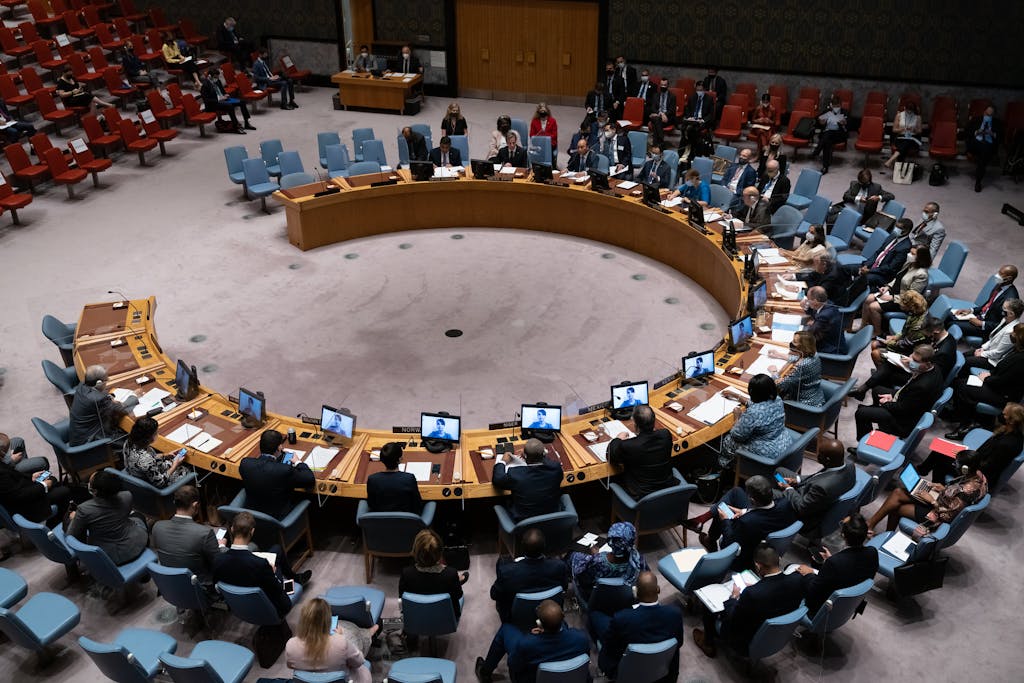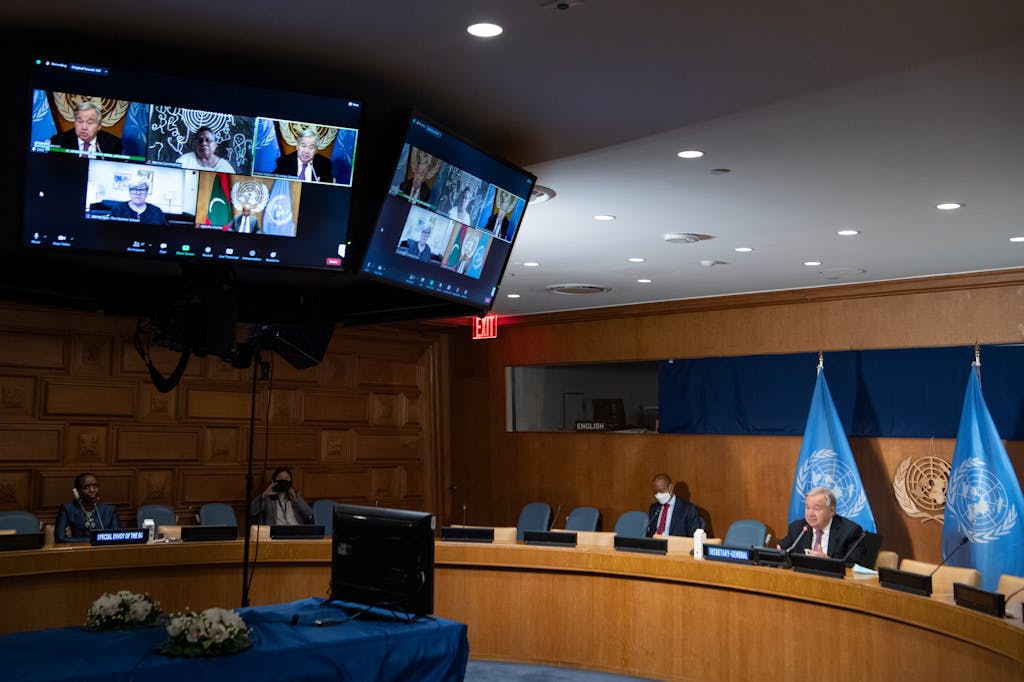The climate crisis topped the agenda at the 2021 UN General Assembly (UNGA), which brought together world leaders and global stakeholders just six weeks ahead of COP26. In the final sprint to Glasgow, UN Foundation Vice President for Climate and Environment Pete Ogden draws on the insights of the UN Foundation’s Climate and Environment team to unpack some of the most significant developments and why they matter heading into November.
The devastating report of the Intergovernmental Panel on Climate Change (IPCC), which left no doubt that the window to avoid catastrophic climate impacts is closing rapidly, has ratcheted up the pressure on countries to take decisive and immediate climate action. Speaking after the release of the report last month, the Secretary-General called it a “code red for humanity” that should spur governments into action. Many leaders repeated his warning during UNGA — a strong signal that climate is exactly where it should be at this critical moment for global cooperation and climate diplomacy: at the center of the multilateral agenda.
Case in point: Important convenings and high-profile moments on climate occurred on every day of high-level week. Here are some of the climate events that dominated the agenda, and below some of the significant announcements and commitments they led to.
- On Monday, Secretary-General António Guterres and British Prime Minister Boris Johnson hosted an Informal Leaders Roundtable on Climate Action to further enhance government ambition in the run-up to the UN Climate Change Conference (COP26) — and Climate Week NYC kicked off for the 12th year.
- On Tuesday, numerous heads of state and government made climate a central focus of their General Debate speeches.
- On Wednesday, climate featured prominently at the first day of the SDG Action Zone.
- On Thursday, the Secretary-General hosted a Food Systems Summit, where the relationship between climate and food was a central topic, and the Government of Ireland hosted an open debate on climate and security in the Security Council.
- And on Friday, the High-level Dialogue on Energy elevated the connection between climate and energy, which is the largest source of greenhouse gas emissions — and youths from around the world organized a massive Global Climate Strike.
The UN Foundation’s Climate and Environment team has identified the key takeaways and next steps in the sprint to Glasgow:
Climate Finance
One of the most serious issues heading into COP26, to be held Nov. 1-12 in Glasgow, Scotland, was the failure of developed countries to fulfill their commitment to mobilize $100 billion per year of climate finance starting in 2020. A recent OECD report that found that developed countries were falling some $20 billion a year short of their pledge further inflamed tensions, and the issue posed a growing threat to the ability of countries to rally together around a strong outcome in Glasgow and beyond.

The Secretary-General made this is a central focus of the week, calling unequivocally for developed countries to deliver on their promise — in his climate finance report to the General Assembly, during the Major Economies Forum (held on the Friday before high-level week), and during the Informal Leaders Roundtable on Climate that he co-hosted with Prime Minister Johnson.
And progress was indeed made. President Joe Biden announced that the U.S. would double its climate-related financial support to developing economies, on top of the doubling he already announced at his Leaders Summit on Climate in April, to reach $11.4 billion per year by 2024 — a major boost toward reaching the $100 billion climate finance goal.
China also stepped up with an important finance announcement of its own: President Xi Jinping declared that China would help developing economies deploy green and low-carbon energy and would stop supporting the construction of coal-fired power plants abroad. That is important progress for a country that has been far and away the biggest supporter of overseas coal power plant construction.
Taken together, these developments mark an important step toward aligning all financial flows with the goals of the Paris Agreement and set the stage for further progress at the upcoming World Bank meetings, the G20 leading global economies, and, ultimately, in Glasgow.
Ocean, shipping, and climate
While the harmful impacts of climate change on the ocean have been garnering increased attention, the ocean is now also starting to get the attention it warrants as a source of climate solutions, both for mitigation and adaptation. The importance of ocean ecosystems as global carbon sinks was on display from a broad set of actors during UNGA, including Seychelles, Colombia, and several other countries that have incorporated protecting these systems in their nationally determined contributions (NDCs). As more countries revise their NDCs over the coming weeks, there is an opportunity for others to follow suit.

During UNGA, the global maritime sector also received high-level attention from governments, the private sector, and civil society, shining a light on what has historically been a fairly isolated sector. Thanks to the launch of the Getting to Zero Coalition’s “Call to Action,” which calls for an ambitious and equitable transition, momentum is building for more zero-emission commitment in the sector, which we expect to continue through the end of the year. The release of the Blue Food Assessment and the growing inclusion of ocean and other aquatic-based food in the global food agenda, including at the Food Systems Summit, also signaled the emergence of the ocean as a critical part of achieving the Sustainable Development Goals (SDGs) and supporting climate action, a trend that will continue through the Our Ocean and UN Ocean Conferences next year.
Food systems and climate
Food systems were also a priority during UNGA as the Secretary-General convened the first-ever UN Food Systems Summit to unleash ambitious new actions to transform our food systems while delivering across all SDGs. Nearly 300 commitments were made by civil society, farmers, youth, Indigenous peoples, and countries, including several new multistakeholder coalitions — and several countries committed new resources to improving global food systems, including a $10 billion commitment from the U.S. over five years.

The summit shone a light on food systems, not only as a driver, but also as a potential solution to the climate crisis. As an example, several countries announced their intention to join Agriculture Innovation Mission for Climate (AIM for Climate), a coalition comprising nearly 30 countries that will seek to accelerate global innovation research and development (R&D) on agriculture and food systems, among other things, to tackle the climate challenge.
As we approach COP26, governments will have the opportunity to take these commitments — including some national food system transition plans — forward by incorporating them into their NDCs and by adopting policies that position food systems as a critical lever for effective climate action.
The Centrality of Climate Change to Our Common Agenda
Stepping back from this narrow window of time between UNGA and the COP, it was notable for countries to start to rise to the challenge that the Secretary-General set out in his Our Common Agenda report to the General Assembly earlier this month to “reinvigorate inclusive, networked, and effective multilateralism.” As part of the intensive yearlong process of developing this report, the UN Foundation provided a number of inputs, including research that unpacks how the past 30 years of multilateral climate cooperation have contributed to driving climate action and helped to create governance systems that can ratchet up ambition in line with the science. It also looks at what will be required in the years to come, including putting people at the heart of the transition to net zero, making that transition universal, credible, and inevitable, and organizing global systems for a low-carbon age.

But first comes the test of Glasgow, our last best chance to keep global temperature rise in check to avoid the most catastrophic impacts of climate change. While there is still much work to be done to make this COP a success, the past week is proof that progress is possible and that multilateralism offers the world the most viable pathway out of the climate crisis.




